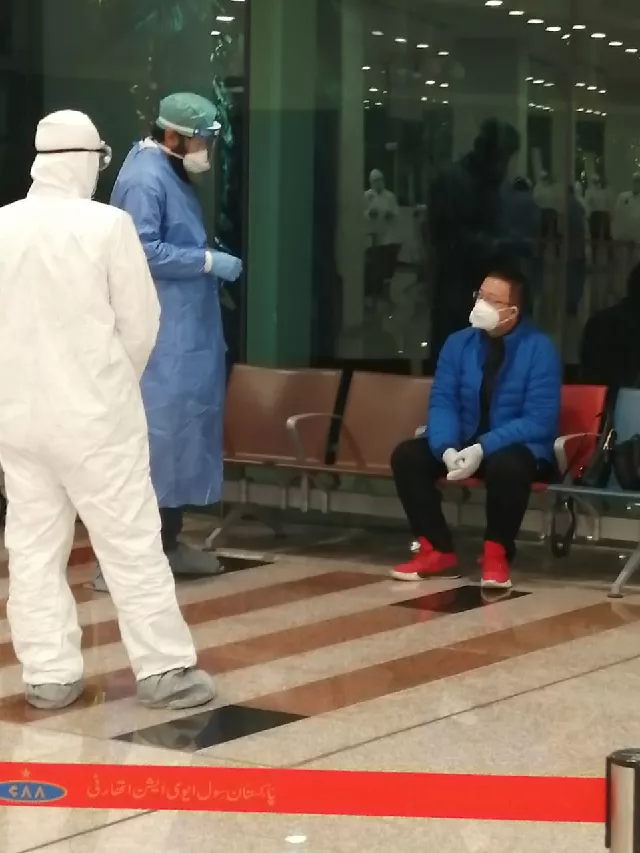Coronavirus on the loose
Controlling a disease like coronavirus is not going to be a herculean task but one that we simply cannot take
With the death toll already soaring past 500 and thousands affected, the novel coronavirus has become a global health emergency in just a few weeks. Cities have been placed under quarantine and millions restricted to limit the spread of the incurable virus.China, the epicenter of the spreading virus, has in the past few days opted out of trading to curb further damage, alongside many multinational brands choosing to halt their operations in the country to help contain the virus.
While authorities worldwide have taken extreme measures to curtail the spread of the virus, the response at home has been too slow and too disappointing.
Several cases of suspected coronavirus have surfaced in the past week causing an alarm and exposing the shortcomings in the country’s health system and disaster management.
The latest case of Shahazaib Rahujo, a resident of Sindh’s Nangeri village studying in China, is a classic case to cite Pakistan’s unpreparedness to tackle the growing virus.
Rahujo, who studies at a university in China around 1,000 kilometres away from Wuhan, reached Karachi on Saturday after much insistence from his family to come back home following the outbreak. Unable to book a direct flight from China, he resorted to reaching the country through Qatar. It was in Qatar that Rahujo experienced headache, flu and cough, and took some medicines to relieve his symptoms which later helped him to get past airport authorities in Karachi without raising alarm.
The suspected coronavirus patient was able to travel to his village in rural Sindh and only when his condition worsened did he think of going to a hospital. Protocols were followed and the patient was placed under quarantine — except that Khairpur Civil Hospital isn’t equipped for quarantine.
Rahujo was, instead, kept in a dengue ward where scores of his relatives kept coming in to inquire after his health and the only barrier separating them was a clinical mask. The doctors refused to provide any treatment and would communicate with him through a phone from another floor. The disgruntled family took matters into their own hands and decided to go to Karachi for treatment. The authorities first refused to let the family travel to the port city but later allowed them to go to Islamabad.
The suspected patient along with his brother and father rented a car for Islamabad and made it across Sindh to Multan where he was stopped and forcibly moved to Gambat Institute of Medical Sciences.
In a similar case, another Pakistani student from Wuhan, Arsalan Amin, flew back to Karachi where he was welcomed by friends and family in Lyari for escaping the deadly virus. It was after three days when authorities felt the need to move Amin to an isolation ward and keep him under observation for 14 days.
If it wasn’t a comedy of errors already, health authorities in Gilgit-Baltistan, the most susceptible province to the virus owing to its proximity with China, inaugurated an ‘isolation ward’ with multiple beds to provide treatment to suspected patients.
The naivety of the common people who only want their loved ones close by without considering the consequences, piles on to the existing problems. Pakistan had initially suspended flights from China, a decision it had to take back owing to pressure from families to bring back stranded students in Wuhan only to impose a ban again to curb the situation. Families need to understand that forcing their loved ones to come back to Pakistan will only make matters worse and endanger thousands of other lives.
Additionally, callousness from health authorities and the lack of facilities needed to tackle suspected coronavirus patients, especially at a time when the world has risen to understand the magnitude of the problem, can prove to be deadly for Pakistan. In a country where people can die of curable diseases, controlling a disease like coronavirus is not going to be a herculean task but one that we simply cannot take.
Published in The Express Tribune, February 6th, 2020.
Like Opinion & Editorial on Facebook, follow @ETOpEd on Twitter to receive all updates on all our daily pieces.


COMMENTS
Comments are moderated and generally will be posted if they are on-topic and not abusive.
For more information, please see our Comments FAQ